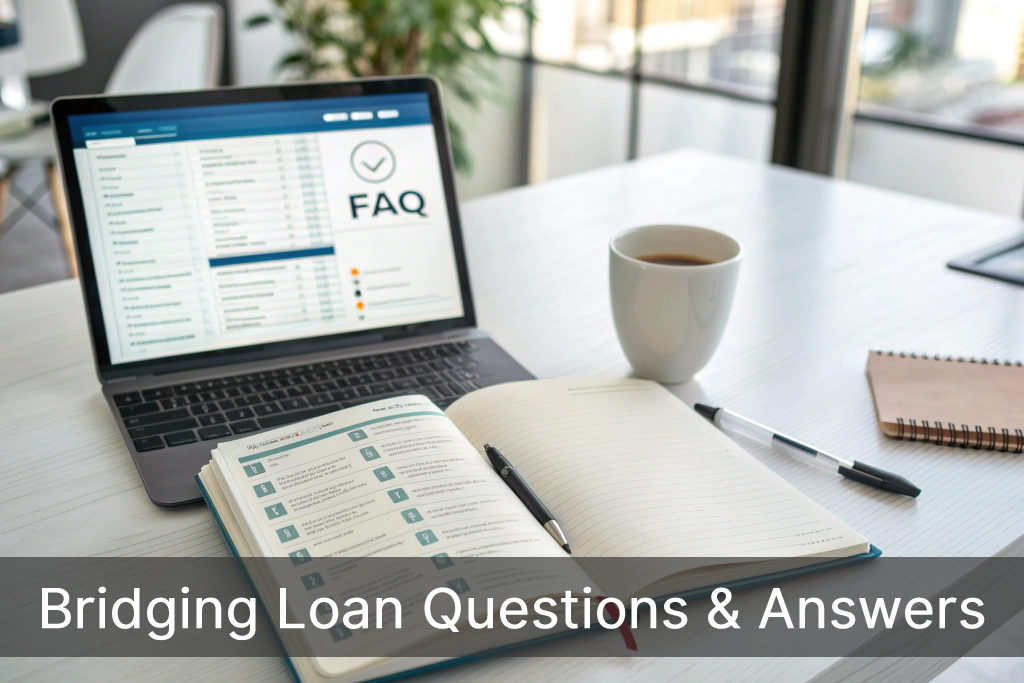Bridging Loan FAQ

Your bridging questions answered
We can provide insight to everything you need to know about bridging finance
Thinking about taking out a bridging loan but not sure how it works? You’re not alone. We’ve helped hundreds of clients navigate short-term funding with clarity and confidence.
Below we’ve answered some of the most common questions we get asked about bridging loans, so you can make informed decisions without the jargon or guesswork.
A bridging loan is a short-term form of finance designed to “bridge the gap” between an immediate need for funds and a longer-term solution, such as the sale of a property or arranging a traditional mortgage.
Bridging loans are typically secured against property or land and are used for situations where time is critical. They’re popular among property investors, developers, and homeowners dealing with delays or urgent purchases (like auctions or chain breaks).
In the UK, a bridging loan works by providing short-term finance secured against property or land. You borrow a lump sum, either to:
- Purchase a property quickly
- Release capital from an existing asset
- Fund a refurbishment or short-term project
Repayment is usually made through:
- Sale of the property
- Refinancing onto a longer-term mortgage
- Business income or other agreed method
You’ll either pay interest monthly or have it rolled up (added to the loan and paid at the end). Once the term ends, usually between 1 and 24 months, you settle the loan in full.
Bridging loans can be a good idea if used for the right reasons. They’re ideal when:
- You need to move fast (e.g., auction purchase)
- Your long-term finance isn’t ready yet
- You’re waiting for a sale to complete
- You’re refurbishing a property for resale or refinance
That said, bridging loans aren’t cheap and should only be used when you have a clear repayment plan. They’re a tool, not a long-term solution.
The cost of a bridging loan depends on several factors:
- The loan amount and term
- Loan-to-value (LTV) ratio
- Type and location of the property
- Your credit profile and exit strategy
In the UK, bridging loan rates typically vary depending on your requirements and factors such as credit. On top of that, you may pay:
- Arrangement fees (typically is 1–2%)
- Valuation fees
- Legal costs
- Exit fees (in some cases)
We’ll always provide a full cost breakdown upfront, no hidden fees, no guesswork.
Yes, you can get a bridging loan to buy a house, especially if:
- You’re buying before selling your current property
- You’re purchasing at auction
- There’s a break in the property chain
- You’re buying a non-standard property that a regular lender won’t touch
Whether you're moving home, investing, or buying to refurbish, bridging can provide the speed and flexibility mainstream lenders can’t.
We can often complete a bridging loan within 5 to 14 days, depending on the complexity of the case.
Here’s what can affect timing:
- Speed of valuation and legal work
- Borrower readiness (docs in order, exit strategy defined)
- Whether the deal involves multiple properties or parties
For urgent cases, we’ve completed them in as little as 72 hours, but that requires fast cooperation on all sides.
Alternatives to bridging loans include:
- Traditional mortgages: Suitable for longer-term borrowing but slower to arrange
- Secured loans: Can be used for borrowing against existing property, though not always ideal for short-term needs
- Personal loans: Limited by loan size and usually unsecured
- Development finance: For ground-up projects or heavy refurbishments
- Mezzanine finance: Often used in layered or complex property deals
Each option has pros and cons, depending on your timeline, exit strategy, and risk profile.
Want to know more about bridging loans?
Criteria
FAQs
Calculator
Application
Let’s get it moving
We know that when the clock is ticking, you need a lender who moves with intent. Whether it’s a purchase, a refinance, or a cash-flow need, we’re here to make it happen. Get in touch today and discover how our bridging loans can support your next move.
Still have questions?
Bridging loans can be powerful when used properly, but the key is in the detail. If you have questions specific to your situation, speak to one of our experts.
We’ll help you decide if bridging is the right fit and guide you through it from start to finish.



